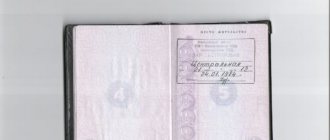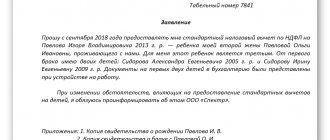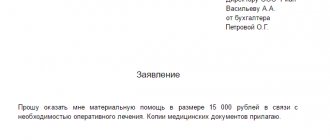Citizens of the Russian Federation are required to register at their place of residence, and this obligation applies to all age categories. If you study the procedure and prepare a package of documents in advance, registering a child at the place of residence will not cause difficulties.
You can register in a variety of ways, from the traditional visit to the territorial department of the Main Department of Migration Affairs of the Ministry of Internal Affairs and ending with the services of the MFC, as well as the State Services portal. This allows the child to receive registration as quickly as possible, which is especially important given the benefits it provides.
Having a registration certificate or a corresponding stamp in the passport allows the child to exercise his social rights. These include kindergartens, where it will be difficult to get a job without registration, as well as medical services. The latter are especially important, because the baby must be constantly monitored by a doctor in the first years of life .
This is what a certificate of registration of a child at the place of residence looks like
Registration deadlines
Among the requirements stipulated by law regarding the registration of citizens, registration deadlines are of great importance. At the same time, current laws do not regulate in any way the time during which a baby should be registered in an apartment. However, if such an issue is not resolved for too long, regulatory authorities may impose a fine.
It is recommended to register young children during the first month of their life, as this will require a minimum package of documentation:
- a completed application on behalf of the parent;
- passport of a citizen of the Russian Federation;
- baby metric.
If you do not have time to register your child during this period, the parent may need a more extensive package of documents, which will complicate the procedure.
Sample application for child registration from a legal representative
According to the rules, minor children must be registered 7 days after moving to a new place of residence. Otherwise, the parent will face a fine.
However, the regulatory authorities do not have the opportunity to find out the actual timing of the move, since according to Article 19.15 Part 2 of the Code of Administrative Offenses of the Russian Federation, documentary evidence is not required to determine the time of the move. This means that theoretically any period of time can pass between discharge and subsequent registration in new housing.
Application for child registration
The application form is posted on the official portal of the Federal Migration Service of the Russian Federation. It can also be obtained at the regional passport office.
The form contains the following information about the applicant:
- Name of the authority to which the application is submitted.
- The person's previous address.
- Information about legal guardians.
- Who is the owner of the residential property?
- Grounds.
- Housing address.
- Identification.
- Information about the citizen providing housing.
- Submission date, signature.
It is possible to submit a handwritten application, as well as sending a form filled out using electronic printing machines. There should be no abbreviations or errors/corrections in the document.
If the form has been printed, the sender’s signature is placed right at the moment the document is handed over to an employee of the structural institution.
It is possible to submit an application on behalf of official representatives of parents/guardians, medical workers or other departments in which the mother or child is located.
If a minor is already 14 years old, he undertakes to independently complete the documentation. Content should be easily accessible and legible. The test is written on a sheet of standard A4 format.
Sample
Application for child registration in form 6:
A sample application for registration of a child by mother can be downloaded here.
Why does a child need registration?
It is important to consider that the registration procedure for a minor can be carried out without taking into account the rules of residence at the new place of residence. Even if there are more people registered in the apartment than the current regulations provide, the child can still be registered in it.
The procedure for registering children is regulated by a number of legislative acts and documents, including:
- Administrative regulations of the Federal Migration Service of the Russian Federation;
- Article 20 of the Civil Code of the Russian Federation;
- Clause 28 of the Decree of the Government of the Russian Federation.
The administrative regulations of the Federal Migration Service of Russia (later the service became the Main Directorate for Migration Affairs of the Ministry of Internal Affairs) on the procedure for registering citizens at their place of residence can be found here.
What can happen if you stay without registration?
The first document describes in detail the process of submitting documentation and the procedure for obtaining a new registration. The second provides for certain restrictions regarding the registration of minors. The third contains a list of documents necessary to carry out the procedure, as well as obtaining a certificate of registration.
The Civil Code provides that a child can be registered exclusively with his parents or one of them, at the place of their actual residence, until he reaches the age of 14 . Such a place is recognized as housing where a citizen lives on a permanent basis or most of the time.
How to register a child?
As mentioned earlier, the list of documents required for registration depends on the age of the child. If you register a baby before he reaches one month of age, general civil documents for the parent and baby, as well as a completed application in Form 6, will be sufficient.
The application form for registration at the place of residence (form No. 6) can be downloaded here.
Sample application for registration of a child at the place of residence
If the child’s age has exceeded this mark, the package of documents required for the registration procedure increases significantly. It includes:
- If a child is registered with one parent, consent from the other, certified by a notary, will be required.
- Parents' marriage certificate, if available.
- A house register will be required in cases where the place of registration is a private house.
- Certificate of ownership of a residential property or a social tenancy agreement when registering in municipal housing.
If the housing is classified as municipal, successful registration does not require the consent of the tenant and other persons registered in this apartment. In cases where housing has been privatized, the child can be registered subject to a number of conditions. First of all, he must own a share or the entire premises, or his legal guardians/parents are permanently registered there.
Any disputes with the owner of the property regarding the child’s registration are resolved exclusively in court.
Sample of father's consent to register a child at the mother's address
In order to register a child, you must contact any of the following government agencies:
- Main Department of Migration Affairs of the Ministry of Internal Affairs;
- Passport Office;
- MFC.
Registration is completed in a fairly short time, not exceeding a week. Based on its results, children under 14 years of age receive an appropriate certificate, and those who have reached the age of 14 receive a stamp in their passport.
If you pre-discharge the child from the previous place of residence and keep the certificate of departure, the registration time can be reduced to 1 day.
Registration of a newborn child
- The newborn is registered in the premises where the mother or father has a permanent place of residence. If the newborn is an orphan, then the registration is issued by the guardian.
- You cannot register children with your closest relatives. If the parents do not have a place of residence assigned to them, then first they themselves need to register at their place of residence.
- It is best to conclude the document within 30 days.
- In order to register where the father lives, an application from both parents must be provided. The mother's document must be certified by a notary.
- If there is only a temporary place of residence, in this situation the newborn can only live with the mother.
We recommend reading: Subsidy for young families, help
Service cost
Since 2005, the registration procedure has been carried out completely free of charge, without paying any fees. However, such a statement is true in cases where the child has Russian citizenship. Otherwise, a fee of 350 rubles will be charged.
If the registration deadlines specified in the legislation are not met, a fine of 2,500 rubles may be imposed on parents. It is important to take into account that when a child is registered in municipal housing, he is automatically allocated a share of the premises on an equal basis with other persons registered there. Privatized housing does not provide for such an opportunity and only allows the child to live on the territory of such an apartment.
Extract from the Unified State Register of Individual Entrepreneurs confirming ownership of the apartment
Specifics of the procedure
There are a number of features and nuances regarding the registration of a minor child in an apartment, which it is advisable to familiarize yourself with in more detail in order to avoid possible problems. First of all, it should be taken into account that up to the age of 14, a child can only be registered where his parents are registered .
It is possible to register him at the place of residence of other relatives, including grandparents, brothers and sisters, only if the child’s parents have registration in the same premises, or if one of the relatives has custody of the child.
When a child has reached the age of 14, he can register with one of his parents without the consent of the other, and on the basis of an application written on his behalf. With the consent of the parent, he can register in another place by submitting an application and documents confirming the right to reside to the appropriate authority.
In practice, parents often have to deal with illegal demands from GUVM employees regarding the consent of both parents necessary for such a procedure. According to Article 61 of the Family Code, each parent can solely represent the interests of his child without the participation of the other.
Excerpt from the Family Code of the Russian Federation
How to properly obtain consent for a child to travel abroad
According to statistics, only 32% of families can go on vacation together. Often children are accompanied on vacation only by their mother or father, sometimes by grandparents or other relatives. Sometimes a child travels with accompanying persons: to sports training camps, to a children's camp, etc. To avoid problems when crossing the border, it is important to know the rules for leaving a child abroad, which have changed somewhat in recent years.
According to the laws of the Russian Federation, if a minor citizen (a person under 18 years of age - ed.) leaves the country together with at least one of the parents, adoptive parents, guardians or trustees, consent for the child to travel abroad is not required from the second parent. It is important not to forget, however, that we are only talking about the child leaving the Russian Federation, and not about entering another country. There are two types of consents: there is the consent of the parents for the departure of the child, which is intended to be presented to the border service officers of the Russian Federation, it must be formalized strictly in accordance with the federal law on the procedure for leaving the Russian Federation and entering the Russian Federation; the second type is consent, which is required by consular offices and embassies to issue a child’s visa. How consent to obtain a visa will be processed is regulated by the legislation of the country where it will be presented.
Each country has its own rules and laws regarding children. The parents of the child will not allow the child into most Schengen countries without the consent of the other parent, even if he is traveling with the other parent. In some countries, such as France, consent is required from both parents in any case, even if the child is traveling abroad with one of them. However, sometimes you can get by with the consent of one of the parents if the second parent does not take part in raising the child and his whereabouts are unknown. In these cases, you must have documents confirming these facts with you. Therefore, when preparing to go on a trip, check with the consulate or embassy about the rules for obtaining a visa for the country where you are planning to enter. After all, ignorance of them may cause you and your child to be denied a visa. Moreover, the reasons for the refusal are usually not reported at the visa center, and you will not know that such a “trifle” ruined your vacation.
Most often, the question of consent is asked by divorced parents, one of whom is going to travel abroad with their child, or if the child is traveling alone. As reported by the Border Service of the FSB of Russia, when a child travels abroad unaccompanied by his parents, according to Russian legislation, in order to leave, he must have with him, in addition to his passport, a notarized consent from one of the parents or guardians to leave, indicating the date of departure and the state he intends to visit. Consent from the other parent is not required. The validity period of a notarial consent is determined by a calendar date or the expiration of a period of time, which is calculated in years, months, days, etc. Also in the consent, the period can be determined by indicating an event that must necessarily occur. For example, reaching the age of majority, expiration of a passport or visa, and so on.
The wording in the consent “until the expiration date of the passport” is undesirable, and without indicating the passport data is completely unacceptable, since it makes it impossible to verify compliance with the departure period at the border. It is best to indicate a specific calendar date. For example, if a child’s foreign passport expires on January 1, 2021, indicate in the consent “until January 1, two thousand and sixteen.” The consent must also indicate specific countries to which the child can travel. General, list formulations, such as “Schengen countries”, “South-East Asian countries”, etc. unacceptable.
If the second parent does not agree that his child can travel abroad of Russia, he can declare his disagreement to the migration service. Border guards will receive the minor’s data, and the minor’s exit from Russia will be temporarily restricted. In this case, the issue of the possibility of leaving is resolved only in court.
Many countries, if a child is going to cross the border unaccompanied by parents, with third parties, require the consent of both parents. These are mainly European countries. In the absence of one, your son or daughter will simply be turned away at the border.
However, there are a number of countries where a child only needs a birth certificate to enter, as well as the consent of one parent if he or she is traveling with accompanying persons. Thus, children under 14 years of age can enter Kazakhstan, Belarus, Kyrgyzstan, Abkhazia, South Ossetia and Ukraine on a birth certificate with an insert or a mark on Russian citizenship.
When receiving consent to travel in person, be sure to ensure that all the data: yours, the other parent’s and the minor’s are entered correctly, check that the dates and the list of countries are correct. The period specified in the consent must correspond to your will and, of course, primarily to the interests of the child.
Another question that often worries citizens and is asked to border guards is whether a child can travel if information about him is included in the parents’ biometric passports.
This mark does not give the child the right to travel outside Russia without his or her passport. But if a child is traveling with a parent whose child is included in the old-style passport, then he does not need his own separate passport. a person under the age of eighteen. a person under the age of eighteen. a document granting a person the right to perform a certain action by a person whose consent is required to complete a particular transaction in accordance with the law. Notarized consents include: consent of the spouse to complete a transaction (both for the acquisition and alienation of property), consent to refuse privatization, consent to travel abroad of a minor child, consent of the owners (tenants) of housing for temporary registration.
Registration using the MFC and the State Services portal
Many citizens use the opportunities provided by multifunctional centers and the online portal of State Services. With their help, it is much easier to obtain a certificate of registration of a child at the place of residence. The algorithm of actions for registration using the MFC will be similar.
The State Services portal allows you to register a minor with minimal time investment. This is due to the fact that the application in the prescribed form is submitted electronically, and the Main Directorate for Migration Affairs invites the citizen to submit it at a specific time. Due to such features, it is possible to avoid long waits in queues, which is the main problem in these institutions.
The registration procedure through State Services is as follows:
- The citizen registers on the portal and logs in using his username and password.
- Opens the “Electronic Services” category, where in the “GUVM Ministry of Internal Affairs” section you should select the service of registration at the place of residence.
- Clicks the “Get service” button and fills in all the fields related to information about the applicant and his child in the pop-up window.
- Waiting for an invitation to the GUVM in electronic form for a specific date and time.
- Visits the GUVM department, taking with him the documents necessary to complete the procedure.
How to register a child at the place of residence through State Services - more details in the video
A week after submitting the application and providing the relevant documents, the child will be registered at the place of residence.
How to submit an application for registration at the place of residence through the State Services portal
Modern electronic technologies allow you to apply for various services without leaving your home, thanks to the State Services portal, including in the same way you can apply for registration by sending an application via the Internet from your computer.
Before sending an application to register a child, you must collect the necessary documents. In addition, you need to register on the State Services website. Registration is free and does not require active actions from the user after registration. The online resource will significantly simplify the registration procedure and save the applicant’s time.
When applying electronically, you do not need to provide a number of documents, such as an extract from the Unified State Register from your previous residential address and others. In addition, when the applicant is invited to the regional department of the Federal Migration Service, admission is carried out without a queue at the established hours.
After registering on the State Services portal you will need:
- Click on the “Personal Account” section.
- Select the “electronic services” item and in the pop-up menu find the item “Name of the organization performing the registration ...”. In this version it is FMS.
- After this, you need to select the item “Registration at the child’s place of residence” and click on the “Get service” button.
- In the window that appears, you need to write down the data in the form that corresponds to the form (form No. 6).
- After checking that the form is filled out correctly, send it to the FMS.
After a while, a notification will be sent in your “personal account”, displaying the following:
- Dates and times to visit your local registration office.
- A list of documents that the applicant must provide for registration in a new living space.
Note. Before arriving at the OUFMS, it is advisable to print out the necessary forms and fill them out. This will save time on filling them out when visiting the institution.
The further procedure for registering a newborn is carried out in accordance with this legislation:
- If the baby is registered at the mother's address, then the father's permission is not needed.
- When registering at the father's address, you must obtain a notarized consent from the mother.
You can learn more about the procedure for registering a child through the State Services portal via video.
( Video : “Government services. Registration”)
Service cost
The legislation of the Russian Federation stipulates that registration of residents of the state is free of charge.
Persons who submit a request for registration or deregistration from a residential area do not need to pay anything. The total registration time should not exceed 3 days. In exceptional circumstances, it can be extended up to 6 days, for example, when sending an application through the State Services website.
If you need to provide additional information and documents to complete the registration, the procedure may take several more days.
Refusal of service
In some cases, parents may be denied such a service. As a rule, it is associated with an incomplete package of documentation provided to the GUVM employee or doubts about its authenticity. The legislation does not provide for other reasons for refusal.
However, during the process of registering a child, certain problems may arise, which it is advisable to familiarize yourself with in advance. The reason for refusal may be the lack of consent of one parent to register the child at a new address . Such an issue can only be resolved in a court hearing, where the main argument in favor of registration should be the improvement of the child’s living conditions.
Sometimes the guardianship authorities can act as a factor preventing a child from obtaining registration. This applies to situations where the child’s living conditions deteriorate significantly due to a change of place of residence. It is impossible to challenge such a decision, which is why parents will need to look for another, more beneficial option for the child’s place of residence.
Court decision to determine the child’s place of residence
It is also impossible to discharge a child if he is the owner of an apartment, has a share in it, or is registered as such in municipal housing. In such a situation, there is no point in going to court, since it will protect the interests of the baby.
If registration is temporary
According to current legislation, parents have every right to register their child in residential premises if they have temporary registration. In this case, the owner’s consent will not be required, and the documentation package will not differ from the standard one. In practice, the owner’s signature will be required when drawing up the application, otherwise there is a risk of refusal of registration.
Temporary registration for a child does not give him any property rights, with the exception of the possibility of using common property entrusted to him by the owner. In this regard, in most cases, homeowners accommodate tenants halfway.
If the owner is against the child being registered in his apartment, the parents will have to terminate the lease, since it will be considered illegal due to the lack of registration of one of the residents.
Certificate of registration of the child at the place of stay (temporary registration)
Thus, the situation with temporary registration at the legislative level and in practice varies greatly. After all, according to the law, the owner cannot prohibit registering a child, but on the other hand, he can simply refuse to sign the document, which will make registration impossible.











